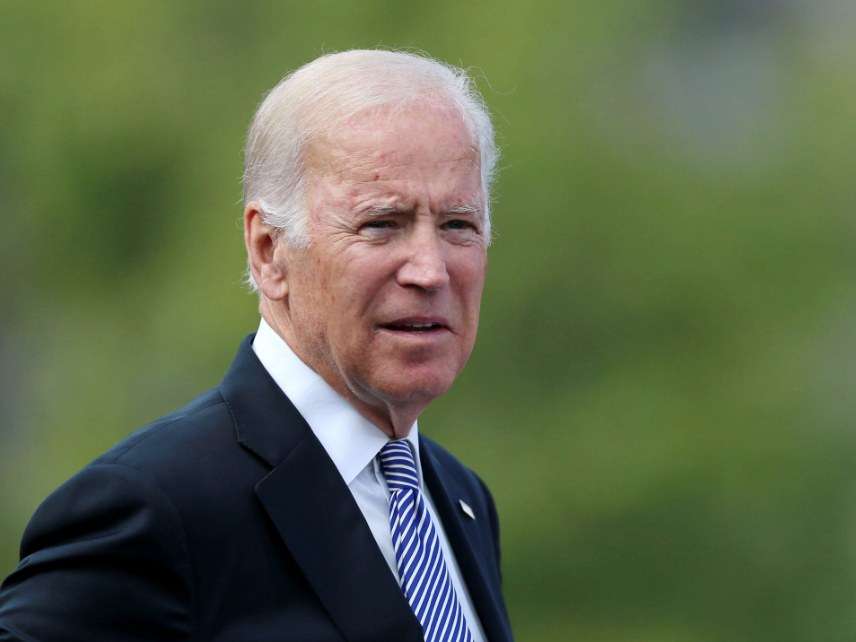Rather Than Running for President, Maybe Joe Biden Should Just Launch an Apology Tour
On Martin Luther King Jr. Day, the former vice president acknowledges regrets about his role in the drug war and mass incarcerations.

At a speech in Washington, D.C. observing Martin Luther King Jr.'s birthday yesterday, former Vice President Joe Biden acknowledged the devastating consequences of his role pushing the drug war into harsher and harsher sentencing when he was a senator.
Most particularly, Biden said he regretted championing legislation in 1994 that ultimately led to the mass incarceration crisis that we're still trying to unwind. The Violent Crime and Control Act of 1994 ordered more severe mandatory minimum sentences for crimes involving crack cocaine than powder cocaine under the panic-driven—but ultimately untrue—belief that crack was somehow different and nastier.
"It was a big mistake that was made," he said Monday. "We were told by the experts that 'crack, you never go back,' that the two were somehow fundamentally different. It's not. But it's trapped an entire generation."
During President Barack Obama's first term, those regulations were fixed under the Fair Sentencing Act of 2010. The bill reduced the federal sentences for crack cocaine crimes so that there was less disparity between those connected to powder cocaine.
But changes in sentencing for federal crimes are often not retroactive. Obama did use pardons toward the end of his presidency to extend some mercy to many federal prisoners serving drug sentences. It took the FIRST STEP Act, passed just before Christmas last year, to make it so that the remaining federal prisoners currently serving time for crack sentences could have them reduced.
Biden is currently mulling over a presidential run, along with every single other Democratic politician you might have heard of. And while one who just formally announced on Monday, Sen. Kamala Harris of California, also has a background of harsh approaches to criminal justice, probably no potential candidate on the left side of the aisle can match the sheer amount of legislation in which Biden has played a role. He's even partly to blame for the expansive authority of the Department of Justice to use civil asset forfeiture to take people's property and keep it for themselves or distribute it to local law enforcement agencies without ever actually having to convict these people of crimes.
Biden should have more than a few regrets. But at least he has finally gotten around to acknowledging the harms his policies have had on poor families and minorities. The same apparently cannot be said of former New York City Mayor Michael Bloomberg, who was at this same event as Biden and is reportedly considering a presidential run himself.
The New York Times notes that Bloomberg declined to talk about his support for stop-and-frisk searches that police used to, without any sort of probable cause, detain and search citizens, particularly young black and Latino males. A judge declared it unconstitutional and his successor, Mayor Bill de Blasio, declined to defend it.
And amazingly, given the current trajectory of political action, Bloomberg is still against marijuana legalization, demanding that the government do more research first (even though it has been the federal criminalization of marijuana that has been standing in the way of research for decades).
If there's ever a sentence that explains why we've called Bloomberg one of Reason's "45 Enemies of Freedom", as well as 2009's "Nanny of the Year," it's this quote from a speech at the University of Toronto in Canada a week ago explaining his continued opposition to marijuana legalization: "This mad, passionate rush to let everybody do things without any research just isn't something we would do in any other way."
This "rush"? America has been locking people up for marijuana use for decades. In order to actually change the laws, it has taken years and years of activism and growing evidence that whatever harms marijuana might cause in long-term consumption is nowhere near the harms caused by incarcerating people for smoking.
If Harris' background as attorney general can jeopardize her presidential chances, it's fascinating that Biden and Bloomberg think they could ever survive public scrutiny of their records.
This post has been updated to correct the effects of the Fair Sentencing Act of 2010.


Show Comments (48)